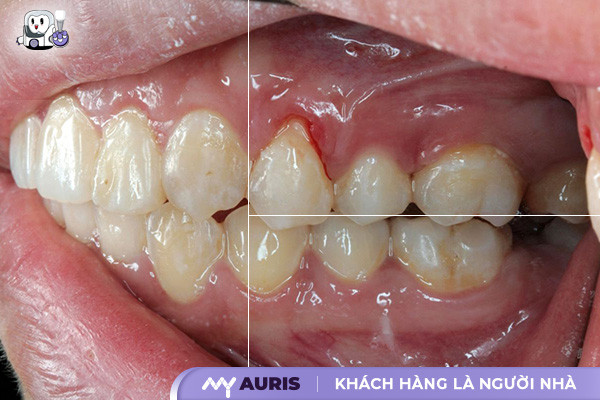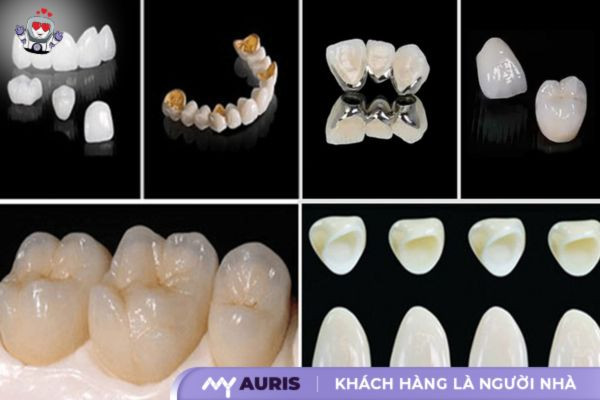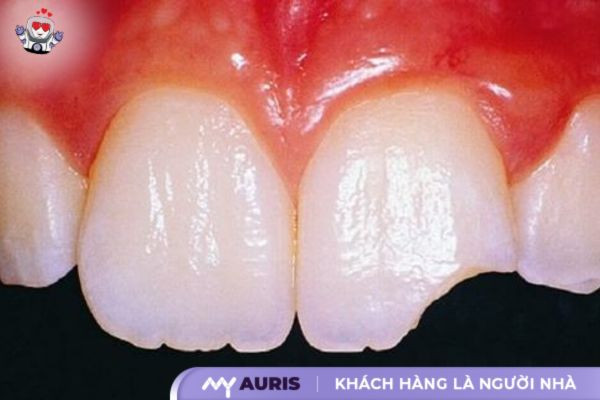Ceramic dental work is a popular solution to restore chewing function, improve aesthetics and bring back a radiant smile. However, sensitivity after porcelain teeth is a common problem, which can cause discomfort and affect life. So what causes sensitivity after porcelain teeth? How to reduce sensitivity and prevent this condition? My Auris will provide useful information about sensitivity issues after porcelain teeth, helping you better understand this condition and take timely measures.
Sensitivity in porcelain teeth, the cause Where?
Sensitivity after porcelain teeth often comes from many different causes, the most common of which is nerve stimulation due to the tooth grinding process. Gingivitis, often caused by poor oral hygiene or poorly fitting porcelain teeth, can also cause sensitivity. In addition, using poor quality dental materials can also irritate the gums, causing inflammation and sensitivity, reducing the quality and longevity of porcelain teeth.
Nerve stimulation
One of the most common causes of sensitivity after porcelain teeth is due to nerve irritation. During the process of grinding teeth for restoration, the dentist may accidentally touch the nerve, causing irritation and leading to a feeling of sensitivity. This often happens in cases where teeth have pulp near the surface or the pulp is infected before porcelain teeth are made.

Gingivitis
Gingivitis is a common condition that can cause sensitivity after porcelain teeth. Gingivitis can be caused by many reasons such as poor oral hygiene, bacterial attack, or because porcelain teeth do not fit tightly with the gums, creating gaps for food and bacteria to accumulate. Gingivitis can cause pain, swollen gums, bleeding and sensitivity, especially when eating or coming into contact with hot or cold foods.
Ceramic teeth do not fit properly
Ceramic teeth that do not fit tightly to real teeth can cause sensitivity by creating gaps.between porcelain teeth and real teeth. This space can be a place for bacteria to hide, causing inflammation and nerve irritation, leading to a feeling of sensitivity.
Poor material quality
The quality of dental materials plays an important role in minimizing sensitivity after porcelain teeth. Poor quality materials can irritate the gums, leading to gingivitis and sensitivity. In addition, poor quality materials may not be able to withstand chewing forces well, causing cracks and affecting the longevity of porcelain teeth.

Learn about sensitivity after making porcelain teeth
Sensitivity after making porcelain teeth This is a common phenomenon when the body adapts to new porcelain teeth. Usually, the sensitivity will subside after a few days, but if it persists or increases, you should see a dentist for a checkup. The porcelain dental procedure is usually painless thanks to the use of anesthesia, but after the medication wears off, some people may experience slight sensitivity. To reduce the risk of sensitivity, you need to clean your teeth properly, use a soft toothbrush, dental floss and have regular check-ups.
Sensitivity after porcelain teeth is normal. usually?
Sensitivity after porcelain teeth is a normal reaction because the body is adapting to new porcelain teeth. However, if the sensitivity lasts too long or the level of pain increases, you should see a dentist for timely examination and treatment.
Is porcelain teeth painful?
The porcelain dental procedure is usually performed with anesthesia, so you will not feel pain during the process of grinding your teeth and installing porcelain teeth. However, after the anesthetic wears off, you may feel sensitivity or slight pain for the first few days.
When should you see a dentist?
If you experience prolonged sensitivity after porcelain crowns or the pain level increases, you should see a dentist for timely examination and treatment. The dentist will examine your oral condition, determine the cause of the sensitivity and provide appropriate treatment.

Properly care for porcelain teeth to reduce the risk of sensitivity
Proper care of porcelain teeth helps protect oral health and reduce the risk of sensitivity:
- Clean your teeth with a soft toothbrush and toothpaste containing fluoride.
- Use dental floss to clean between teeth.
- You should visit your dentist for regular checkups every 6 months for professional advice and oral hygiene.
- How long does sensitivity last after porcelain teeth?
The feeling of pain after porcelain teeth usually lasts from a few days to a few weeks and will gradually decrease as the body adapts. However, this time can vary depending on the condition Causes of sensitivity, dental condition, type of porcelain teeth and implementation technique. Factors such as gingivitis, poorly fitting porcelain teeth, incorrect tooth grinding techniques, or improper oral care can prolong the feeling of sensitivity
Usually lasts from a few days to a few weeks
Normally, the feeling of sensitivity after porcelain teeth will gradually decrease within a few days or weeks. This is a normal reaction of the body when adapting to new porcelain teeth. However, the duration of sensitivity can vary depending on the person and the cause. causing sensitivity.
Factors affecting the duration of sensitivity
A number of factors can affect the duration of sensitivity after porcelain teeth, including:
- Causes of sensitivity: If the sensitivity is due to mild nerve stimulation, the duration of sensitivity may be shorter. On the contrary, If the sensitivity is due to gingivitis or poorly fitting porcelain teeth, the duration of sensitivity may last longer.
- Dental condition: If you have a history of gingivitis, the duration of sensitivity may be longer than for people without a history of gingivitis.
- Type of porcelain teeth: Porcelain teeth have different structures, some types of porcelain teeth can cause more sensitivity than other types of porcelain teeth.
- Ceramic tooth making technique: Porcelain tooth making technique affects the level of sensitivity. If the technique of grinding teeth or installing porcelain teeth is not correct, it can irritate the nerves and lead to prolonged sensitivity.
- Dental care: Proper oral care after porcelain crowns can help reduce sensitivity and shorten the duration of sensitivity.
- Overall health: Your overall health can also affect the duration of the sensitivity. If you are in good health, your body will recover faster and sensitivity will decrease faster.
Compare the sensitivity of different types of teeth porcelain?
The sensitivity of porcelain teeth can vary depending on the type of material, manufacturing technique and dental condition of each person.

Sensitivity may vary depending on the type of ceramic material, manufacturing technique and each person’s dental condition. 5 ways to reduce sensitivity after making porcelain teeth at home
Sensitivity after making porcelain teeth is a common condition that can cause discomfort. Warm salt water helps clean the oral cavity, reduce gingivitis and neutralize acid, helping to reduce sensitivity. Mix a cup of warm water with 1/2 teaspoon of salt, gargle for 30 seconds, spit out and repeat 2-3 times a day.
Gargle with salt water
Salt water gently cleanses the oral cavity, removing food debris and bacteria that can cause irritation. At the same time, salt water has mild antiseptic properties, helping to reduce gingivitis, a common cause of porcelain tooth sensitivity.
Use toothpaste for sensitive teeth
Toothpaste for sensitive teeth often contains ingredients that help soothe gums, reduce tooth sensitivity and gradually reduce the feeling of pain.
Using pain relievers
Using pain relievers is a problemFind out the most effective ways to reduce sensitivity after porcelain teeth. Your dentist will prescribe pain medication appropriate to your condition. You should follow your dentist’s instructions for using the medicine to achieve optimal results and avoid side effects.
Ice
Ice Ice on the sensitive area of the porcelain tooth helps reduce swelling and numb the nerves, thereby reducing pain. You can use a small ice cube wrapped in a thin towel and apply it to the sensitive area of your porcelain tooth for about 15-20 minutes at a time, 3-4 times a day.

Applying ice to the sensitive area of a porcelain tooth helps reduce swelling and nerve paralysis, thereby reducing pain Avoid eating hot foods or cold
Hot or cold foods can stimulate nerves, increasing the feeling of sensitivity. To minimize sensitivity, you should avoid eating foods that are too hot or too cold in the first few days after getting porcelain teeth. You should eat foods that are warm, soft and easy to chew.
When should you see a dentist after porcelain teeth?
Sensation after porcelain teeth is a normal phenomenon and will usually decrease over time. However, in some cases, sensitivity can be a sign of a more serious problem. You should see a dentist immediately if you experience the following conditions:
Prolonged or increased pain
Sensitivity after porcelain teeth usually reduces over time. However, if the sensitivity lasts more than a few weeks or the pain level increases, you should see your dentist for a check-up. Your porcelain teeth may be having problems such as cracking, not fitting properly or being infected.
There are signs of gingivitis
Gingivitis can cause pain, swollen gums, bleeding and sensitivity, especially when eating or coming into contact with hot or cold foods. If you experience gingivitis after porcelain crowns, see your dentist for timely treatment. Gingivitis, if left untreated, can lead to more serious periodontal diseases, affecting your oral health.
Broken or cracked porcelain teeth
If the porcelain tooth is broken or cracked, you will feel pain when chewing and may experience sensitivity. You should see a dentist immediatelyimmediately to have porcelain teeth repaired or replaced. Broken or cracked porcelain teeth not only cause pain but also affect chewing function and aesthetics.

If the porcelain tooth is broken or cracked, you will feel pain when chewing and may experience sensitivity. You should see a dentist immediately to have porcelain teeth repaired or replaced How to prevent sensitivity after porcelain teeth
After When getting porcelain teeth, you may experience uncomfortable sensitivity. To prevent and limit this situation after porcelain teeth, you can do the following solutions:
Choose an experienced dentist
Choosing an experienced, highly skilled dentist is the most important factor to minimize the risk of sensitivity after porcelain teeth. An experienced dentist will know how to grind teeth correctly, fit porcelain teeth to fit the real teeth, minimize nerve irritation and reduce the risk of gingivitis.
Proper oral care how
Proper oral care after porcelain crowns is one of the most effective ways to prevent tooth sensitivity. You should:
- Clean your teeth with a soft toothbrush and toothpaste containing fluoride.
- Use dental floss to clean between teeth.
- Rinse your mouth with warm salt water after eating.
- You should visit your dentist for regular check-ups every 6 months for professional advice and oral cleaning.
- Avoid chewing foods that are too hard or too chewy.
- Limit the use of acidic substances such as soft drinks and alcohol.
Avoid bad habits
Some bad habits can increase the risk of sensitivity after porcelain teeth, including:
- Chewing pens, biting nails or other hard objects.
- Use a bamboo toothpick to floss your teeth.
- Sleep on one side, putting pressure on porcelain teeth.
- Eating and drinking too hot or too cold.
Frequently asked questions about sensitivity after porcelain teeth
Here are some frequently asked questions about porcelain tooth sensitivity:
Sensation after dental work Is porcelain normal?
Sensitivity after porcelain teeth is a normal reaction of the body when adapting to new porcelain teeth. However, the level of sensitivity can vary depending on the person and the cause of the sensitivity. Usually, the feeling of sensitivity will gradually subside within a few days or weeks.
When should I see a dentist if I still have pain?
If you experience sensitivity that lasts longer than a few weeks or the pain level increases, you should see your dentist for a check-up. Maybe your porcelain teeth are having problems such as cracking, not fitting properly or being infected. Your dentist will help you determine the cause of the sensitivity and recommend appropriate treatment.
Is there a way to reduce sensitivity faster?
You can apply some simple ways to reduce sensitivity after porcelain teeth, such as:
- Use pain relievers as prescribed by your dentist.
- Apply ice to the sensitive area of the porcelain tooth.
- Avoid eating foods that are too hot or too cold.
- Proper oral care to prevent gingivitis.
Can avoid sensitivity after porcelain teeth?
It is impossible to completely avoid sensitivity after porcelain teeth, but you can minimize the risk of sensitivity by:
- Choose an experienced, highly skilled dentist.
- Proper oral care.
- Avoid bad habits.

Choose an experienced, highly skilled dentist to limit sensitivity after dental work Sensitivity after porcelain teeth is a normal phenomenon and will usually gradually decrease. Over time, you can apply some simple ways to reduce sensitivity and quickly regain comfort. However, if you experience prolonged sensitivity or increased pain, please see your dentist for timely examination and treatment. and most comfortable.
Duong Duong






